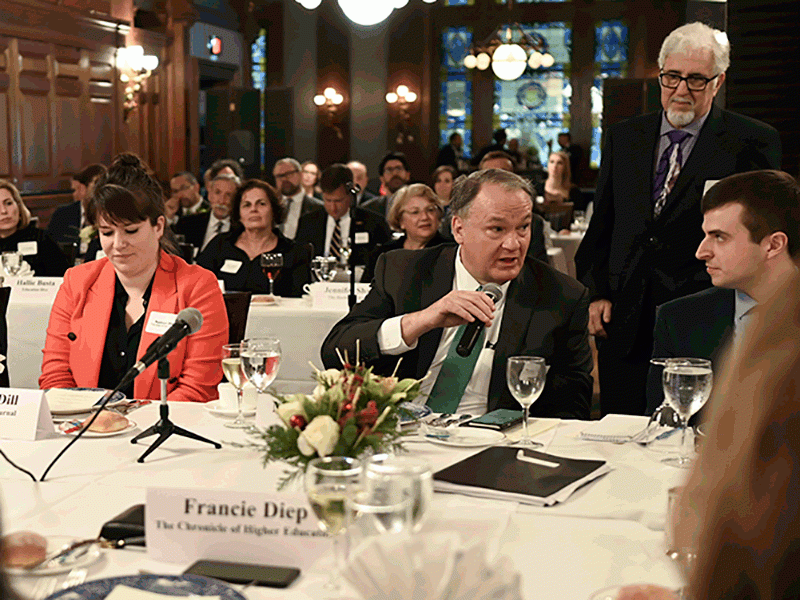Tulane President Mike Fitts meets the press at Penn Club media dinner
Student debt, diversity and ideological divides over support for universities were just some of the many topics covered in a wide-ranging discussion at a national higher education media dinner Tulane President Mike Fitts attended this week.
Held in Midtown Manhattan, the gathering featured leaders from more than a dozen universities, both public and private, ranging from large, land grant state universities to small liberal arts colleges.
Nearly every major media outlet was represented at the dinner, including The New York Times, Washington Post, Wall Street Journal, NPR, TIME and NBC, as well as leading educational publications such as the Chronicle of Higher Education, Inside Higher Ed and the Hechinger Report. The dinner was sponsored by Arizona State University.
With impeachment hearings underway in Washington, D.C., one of the evening’s first question related to negative views regarding higher education held by a sizable number of Republicans and others from conservative quarters.
While acknowledging a partisan divide in support for higher education, Fitts noted that a deeper look at the data reveals widespread support for research universities like Tulane across the political spectrum.
Our country continues to recognize the great value of higher education’s research enterprise, he emphasized.
“Of course, in the past, Republicans were very supportive of higher education generally,” Fitts said. “What changed? Part of it is ideological. There is a perception that universities are not the open forums they claim to be.”
He added that charges of elitism leveled against universities by some conservatives also gained traction this year after a federal investigation revealed that prominent business leaders and celebrities used bribery, inflated test scores and presented non-athletes as sport standouts – all in an effort to enroll their children in prestigious universities.
Fitts suggested schools continue to broaden their geographical reach, enrolling more students from across the country, including rural areas, and rigorously monitor their admission practices in the broadest sense.
“We took Varsity Blues (the nickname for the federal investigation that uncovered the admission scandal) as an opportunity to look at our own processes. It never occurred to me, or any of us I think, that a walk-on could be a work around to game the admissions process,” Fitts said.
University support for K-12 higher education was also a discussion point, with Fitts underscoring Tulane’s heavy involvement in improving local public schools.
“It is clear that the fate of private universities such as Tulane is tied to the fate of the city and vice versa,” he said, repeating a quote by the late Sen. Daniel Patrick Moynihan that the way to build a great city is to create a great university and wait 200 years.
One of the evening’s most pointed queries came from Fox News’ Lynne Jordal Martin, who asked if the university as we know it today will exist 15 years from now.
Despite seismic changes that include online degree programs and the pedagogical implications of artificial intelligence, Fitts said traditional modes of higher education that bring scholars from varied backgrounds to live, study and discover together may be needed more today than ever before.
“The critical four-year residential university experience where students come from all over the world to study together is still relevant. I don’t see that going away. In some ways, this is a Golden Age of higher education,” Fitts said.

